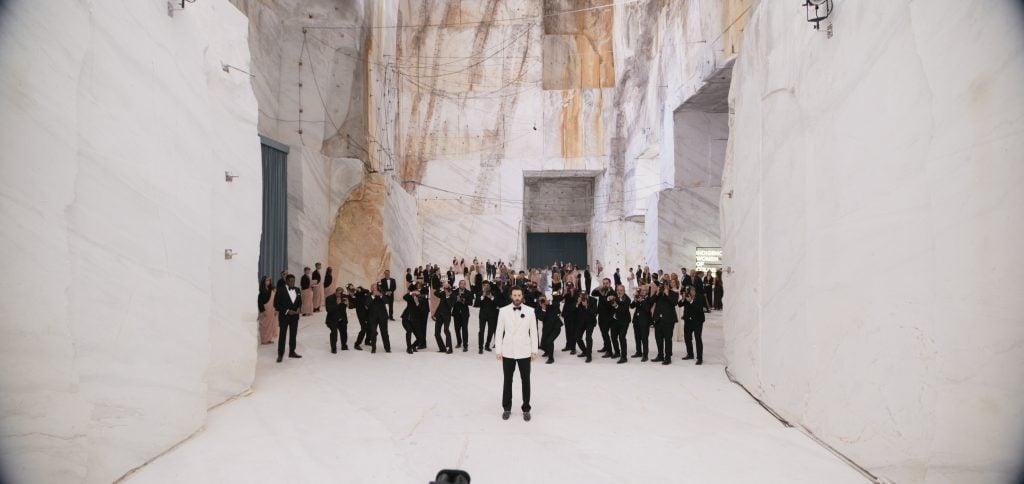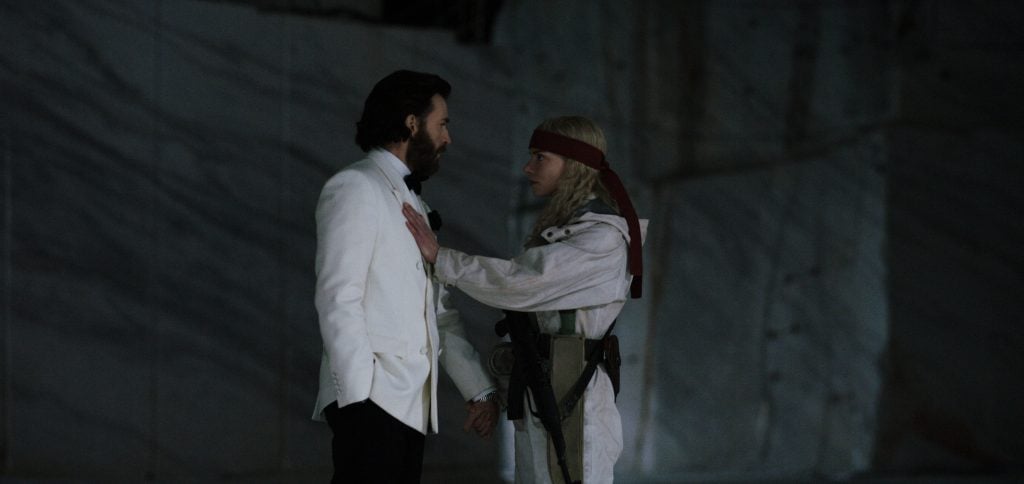Let’s talk about Chris Evans.
Evans occupies a complicated space in Hollywood. He is one of film’s most recognizable faces, thanks in large part to playing Steve Rogers, the first Captain America, within the zeitgeist-shifting MCU machine. The role made him a household name, but also left him at a crossroads once he hung up the shield at the end of Avengers: Endgame. After a decade at the center of popular culture, with the MCU shifting the calculus of cinematic success from being star-driven to character-driven, where does he go? How does he move beyond Captain America to differentiate himself as a force in his own right? A more interesting question: should he even bother?
Sacrifice, Evans’s third film this year, asks similar questions of his character Mike Tyler. Mike is a popular action movie star, but he’s been stuck in a creative rut. That, and the lingering grief from his father’s death, has created the perception that his career is in crisis. Mike decides the best reboot is to jump onto an unassailable social cause: climate change. He attends a glitzy gala dinner in a Grecian cave, hoping to make a grand, viral-ready statement about the hypocrisies at the core of the gala. Unfortunately for him and everyone else in the room, his moment is hijacked by a group of terrorists led by Joan (Anya Taylor-Joy). The group kidnaps him, Braken (Vincent Cassel), the world’s richest man, and Katie (Ambika Mod), a performance artist, to fulfill a prophecy that would prevent Armageddon.
Sacrifice is, first, foremost, and most successfully, a full-grill skewering of the celebrity ecosystem and the shallow narcissism that feeds it. Mike Tyler is the perfect stick for Romain Gavras, directing his first English-language feature, to charbroil. He doesn’t shy away from the inevitable similarities between Mike and Chris Evans. In fact, he gleefully plows right through them. We first meet Mike en route to the charity gala, frustratedly fluffing his hair to hide any potential bald spots. (His agent assures him that they can make a quick jaunt to Istanbul to course correct.) He believes that everyone’s eyes are on him, a lingering effect of a viral video of him in the midst of a meltdown. The film has plenty of fun with the cognitive dissonance of his obsessive vanity and the reality that people don’t think much of him.
However, there is more to Mike than jokes at his expense. Gavras’s celebrity-gutting satire works because of the heightened and complex emotions that ground the actor’s less charitable behavior. Mike struggles with obsessive overthinking and panic attacks several times, spurred by his fear that his career is one wrong move from being over. Gavras threads these moments in between and even within the scenes that laugh at him. His stressed-out doomscrolling through the social media responses to his ridiculous “mic drop” interruption at the gala is hilarious, but also very sad as we watch how it hurts him. Mike is vain, vapid, and a couple of paces slow on the uptake (he doesn’t realize that he’s in a hostage situation until well after he’s returned from the bathroom). However, you sense that he means well, or means well enough. Aside from the frantic antics, Mike is yearning for something more.
That yearning powers Sacrifice’s second half, when Joan forces the three hostages through the Grecian wilderness to reach the volcano. Mike is bewildered, confused, and still unsure that this hostage crisis is real. He is, however, compelled by Joan’s unwavering faith in the prophecy and, therefore, in him. Again, Gavras balances these moments of authentic reflection with the silly and satirical ones. One of Sacrifice’s best scenes goes a step further, placing Mike in a dream sequence that needles at his ridiculous traits, from his terrible films to the threat of balding. At the center of the increasingly bizarre stages is a man desperately seeking something meaningful to ground him. Yes, Mike is still someone who will check his scalp after waking from said psychedelic dream, but that’s less of a bug than a feature of a complex character navigating an otherworldly, world-tilting experience.

Mike Tyler’s complexities are what Chris Evans has been waiting for his entire career. Sacrifice is the complete realization of his screen persona and how its two modes contrast and complement each other. There is his “asshole” mode, where he relishes being the bad or pathetic guy that subverts his matinee-idol looks. Gavras’s direction and heightened environment give Evans the space to be obnoxious and ridiculous without being abrasive or looking uncomfortable. He matches and even shapes the film’s comic rhythms with verve and confidence, whether he’s flailing his body about in histrionics or graciously and incorrectly accepting applause from his fellow beleaguered hostages.
His “asshole” mode here melds wonderfully into his traditional “nice guy” mode, shaped by his innate ability to convey inviting goodness and sensitivity. With Mike, Evans demonstrates the mode’s darker shades, reinforced by self-doubt. He lays Mike’s debilitating anxiety out before us, his eyes and face crumbling under the weight of his own thoughts. He leverages that same vulnerability to endear us to Mike’s search for purpose, carefully balancing candid yearning with baffled but intrigued awe within even the film’s more outlandish scenes. Several close-ups of Evans are amongst his most deeply affecting work on-screen, with him trusting Gavras to fully, honestly capture the unguarded rawness he uncovers. Mike Tyler is the richest, most comprehensive role Evans has ever had to tackle, and he meets the moment splendidly, delivering the best performance of his career.
If Sacrifice were solely focused on Mike Tyler’s transformation from untethered egotist into someone more, it would be a triumphant deconstruction of our present celebrity zeitgeist. Gavras stumbles in threading the environmental commentary through his satirical framework as elegantly as he did the celebrity commentary. While he offers stunning visuals of nature’s volatile beauty, Gavras can’t decide what that means to the story. Are humans helpless against the environment’s violent delights, and postulation is our only path forward? Or, as Barken rants on his way to the volcano summit, is Joan’s prophecy pure delusion, and humans are meant to dominate nature? Gavras’s answer is quite muddled, as are the rules and regulations of Joan’s eco-cult, which are twisted into knots to reach a scenario where Mike and Joan are the prophecy’s heroes. That narrative indecision undercuts the film’s momentum and satirical bite.
The full, unwavering commitment of Sacrifice’s cast compensates for the film’s weaker thematic and narrative elements. Anya Taylor-Joy is a surprisingly strong counterpart to Evans’s character and performance. As Joan, she conveys a wicked-sharp, steely resolve that enriches her character’s absurdist zealotry. It also plays well in a comedic context, with Taylor-Joy playing straight-woman to the bonkers chaos she incites. Taylor-Joy’s uncompromising strength and Evans’s vainglorious insecurity ignite fascinating chemistry between them. It isn’t necessarily romantic (although Gavras doesn’t snuff out the potential outright), but they work so well together that you do believe that Joan and Mike are destined to mean something to each other. Ambika Mod has a relatively small role compared to Joan and the other sacrifices, but her frantic, quick-witted energy adds a much-needed jolt to the film’s wobbly middle passage.
Most actors understand the mechanics of their screen persona and its operation within the larger cultural framework. Fewer actors have the means, opportunity, and bravery to actively engage it. With Sacrifice, Chris Evans has all three. Romain Gavras’s playful, absurdist take on celebrity egotism and its vulnerable vices gives the actor the perfect vessel to thoroughly interrogate his career and where he might go from here. He grants Gavras the same, but in the service of Gavras’s attempt to challenge our relationship to celebrity and our demands of them, whether we want genuine authenticity or the empty performance of it. While not without flaws, Evans and Gavras’s film is one of the year’s most effective unions of actor and auteur.
Sacrifice held its World Premiere as part of the Special Presentations section at the 2025 Toronto International Film Festival.
Director: Romain Gavras
Screenwriters: Romain Gavras, Will Arbery
Rated: NR
Runtime: 103m
Mike Tyler is the richest, most comprehensive role Evans has ever had to tackle, and he meets the moment splendidly, delivering the best performance of his career.
-
GVN Rating 8.5
-
User Ratings (3 Votes)
5.9
A late-stage millennial lover of most things related to pop culture. Becomes irrationally irritated by Oscar predictions that don’t come true.






